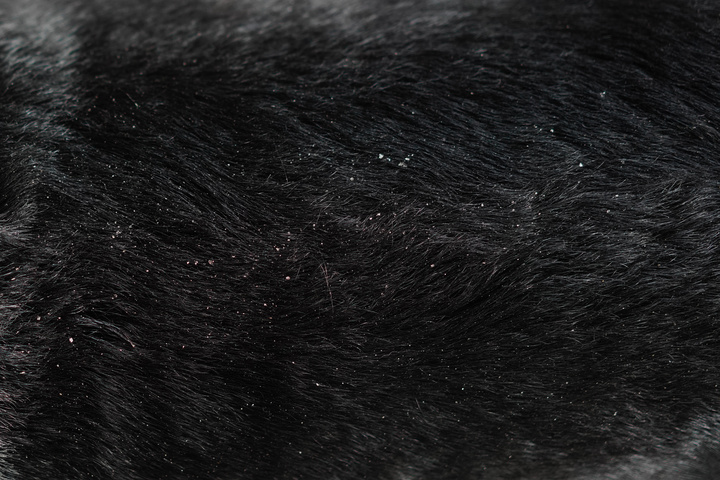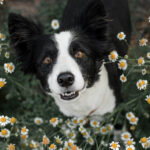Like humans, dogs can experience dandruff when dead skin cells flake off faster than usual. Once they flake off, they settle in your dog’s fur and become visible – mainly near the tail. Contrary to what you might think, dandruff can occur if your dog’s skin is excessively dry or oily. You may notice them the most when you pet, brush, or bathe your dog.
Signs that your pup may have dandruff include itchy skin, excessive licking or biting, red and irritated patches of skin, and hair loss. Your dog’s skin may also develop scabs or sores. An unpleasant odor might accompany these symptoms.
Why does my dog have dandruff?
Various factors can cause your furry friend to experience dandruff, known as seborrheic dermatitis. Identifying the underlying cause is crucial to effectively treating the condition.
Allergies
Food and environmental allergies often present first in dogs as skin problems. Allergies may cause an overproduction of sebum, leading to excessively oily skin. Signs of environmental allergies usually include a combination of symptoms, including dandruff, chronic ear or skin conditions, and paw licking.
Nutritional issues
A poorly balanced diet may cause a lack of nutrients essential for skin and coat health. Unhealthy skin is more likely to become unbalanced, causing dandruff and other skin conditions. Furthermore, a poor diet may also increase the risk of obesity, which can cause health issues such as diabetes, which can compromise skin and coat health.
Dry air
Dry skin leading to dandruff may occur if you live in a dry climate or during winter months when the air has less moisture. Forced air heating can also make the condition worse.
Hormonal conditions
Both hypothyroidism and Cushing’s disease cause unbalanced skin, leading to irritation and dandruff. A weakened immune system caused by these medical conditions can also make dogs more susceptible to secondary infections.
Skin infections
Fungal and bacterial infections cause the skin to become weak and may encourage dandruff and secondary skin infections.
Should I take my dog to the vet for dandruff
There is generally no reason to visit the vet if your pup has mild or seasonal dandruff. However, if your canine companion consistently has flaky skin along with a host of other symptoms, including loss of fur, excessive licking or chewing, skin odor, loss of appetite, digestive issues, lethargy, inflamed and red skin, a vet check is a good idea to rule out anything serious.
Natural remedies for mild dandruff and itchiness
If your canine companion has a mild or seasonal case of dandruff, here are some natural ways to ease their skin and help restore balance.
Bathing and grooming
Regular bathing (but not over-bathing) can help prevent bacterial and fungal skin infections that lead to dandruff. Medicated shampoos may be a good choice—check with your vet. Otherwise, use a gentle oatmeal-based shampoo with no additives.
Brushing your furry friend helps spread any excess oils on the skin so they don’t pool in one place. It also helps remove dead fur that can irritate the skin. Brush daily and weekly during an outbreak of dandruff to maintain healthy skin.
Humidifier
For those in an arid climate or winter, a humidifier helps keep moisture in the air and prevent skin from drying out. Always keep the machine clean and filled with fresh, distilled water.
Healthy diet
A balanced diet of whole foods is necessary for your pup’s overall well-being.
Essential fatty acids like omega-3 and omega-6 and vitamins E, biotin, and vitamin A are necessary for healthy skin and coat. Most processed food contains too little omega-3 and too much omega-6, which creates an imbalance. If you feed your furry friend a highly processed food loaded with additives, it’s time to switch to something cleaner and fresher. Aim for food that is human-grade and contains a good balance of macronutrients.
Probiotics
In addition to a healthy diet, high-quality probiotics can improve your pup’s overall health and well-being by balancing the gut microbiome. Probiotics keep yeast and other fungal infections at bay and boost your dog’s immune system, which results in healthier skin and coat.
Apple cider vinegar
Apple cider vinegar contains anti-inflammatory, antibacterial, and antifungal properties that soothe the skin. Mix half water and half raw, unfiltered apple cider vinegar in a spray bottle. Spray directly on irritated (but not open) skin. Repeat once a week (but no more) for best results on minor dandruff outbreaks.
Coconut oil
Like apple cider vinegar, coconut oil contains soothing and therapeutic properties that can help improve the health and appearance of your dog’s skin and coat. Add ten drops of oil to a bowl of warm water and apply directly to your dog’s fur and skin. Coconut oil also works well as a conditioning treatment after a bath.
Regular skin checks are a good idea
Regularly checking your pup’s skin is a good idea to avoid any issues. Regular brushing and plenty of belly scratches allow you to peek at your furry friend’s skin and coat to ensure it is in great shape.






